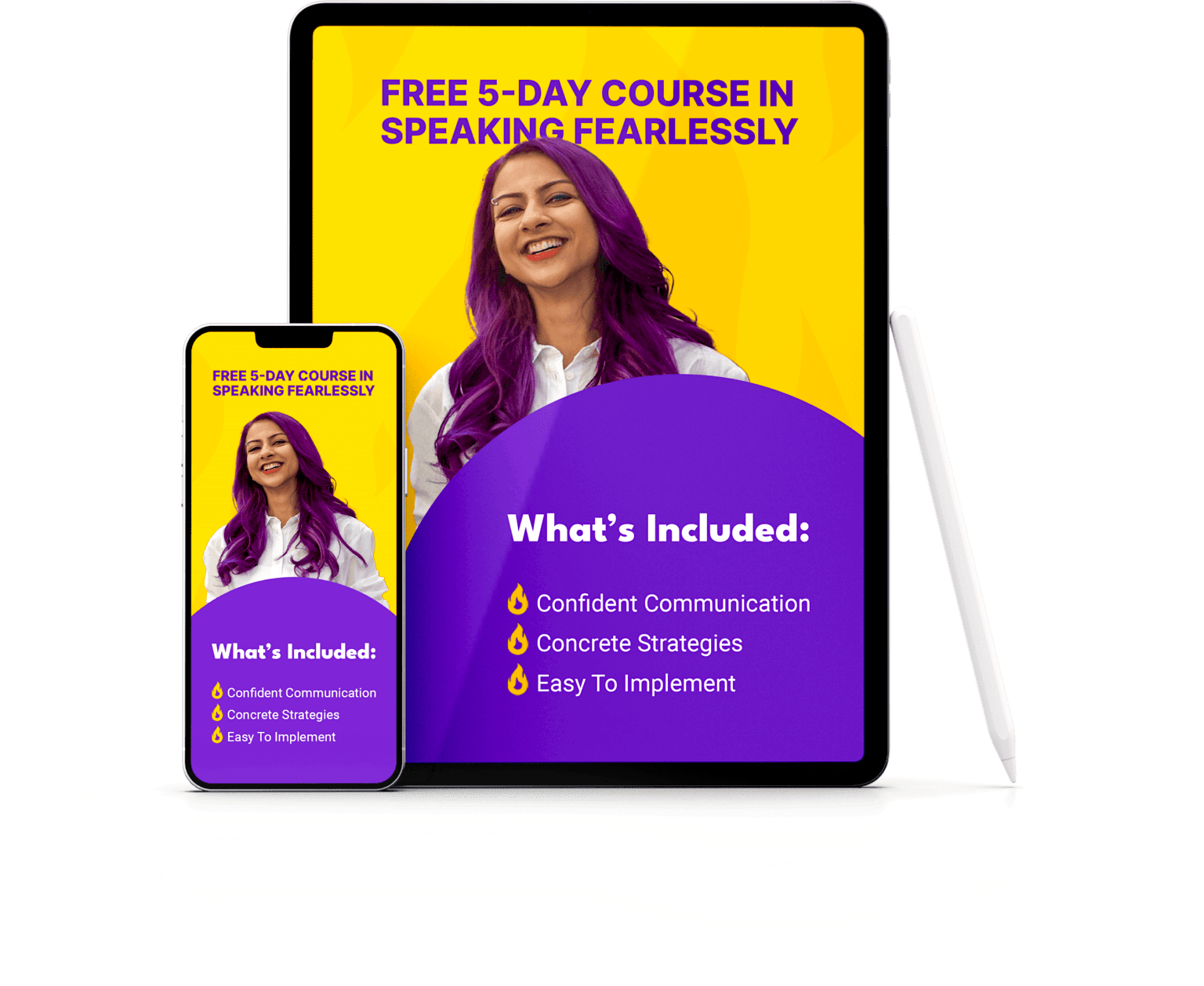Glossophobia, or the fear of public speaking, has its grip on a staggering 74% of us, silently sabotaging careers and entrepreneurial ventures. The sheer scale of this universal fear is equivalent to millions of people sweating bullets at the mere thought of addressing a crowd.
As someone who has coached 300+ entrepreneurs and executives through their speaking journeys, I’ve witnessed firsthand the paralyzing grip this fear can have.
I have worked with clients who had spoken in public before but still experienced slight nervousness. There are also those who experience full-on panic and fear at the mere thought of speaking in public.
But what if there was a way to conquer this debilitating fear?
What if you could stand confidently in any room, delivering presentations to a captive audience, without an ounce of anxiety? This blog pulls back the curtain on strategies successful speakers utilize, offering you the tools to beat Glossophobia and excel in public speaking.
I’m going to help you wrestle this giant, in plain, easy language – no jargon or psychobabble. Walk with me.

Table of Contents
Unraveling the Mystery: Understanding Glossophobia
In this section, you’ll:
– Gain a clear description of what Glossophobia is;
– Learn about the scientific reasons behind why it occurs;
– Discover the impacts on life and career caused by Glossophobia.
What is Glossophobia: A Brief Overview
Glossophobia might come across as a complex term but it’s quite straightforward – it’s like having super intense nerves when speaking in public, way beyond just feeling butterflies in your stomach. It can make things like speaking in front of others or even chatting in a group feel extremely difficult.
It’s surprising to find ourselves fearing something as simple as conveying our thoughts. But, the fear exists, and it restricts folks from expressing themselves openly.
It’s important to remember that Glossophobia isn’t solely about speaking to large audiences. It can emerge even when engaging in everyday conversations or while speaking to a handful of people at workplace discussions. This fear can cause one to experience crippling bouts of anxiety, overwhelming panic, and in severe instances, physical discomfort.

The Science Behind Glossophobia: Why it Happens
Why does one’s heart race when they stand up to speak in front of others? Scientific studies indicate that Glossophobia usually stems from a variety of factors such as personal experiences, personality traits, and biological factors.
Negative experiences like being embarrassed or criticized while speaking publicly in the past often play the villain here. Over time, such incidents can cause a deep-rooted fear to settle in. And, let’s not forget the nerve-wracking experience of repeatedly questioning oneself: “What if people judge me?”, “What if I mess up?”
On a biological level, our body’s innate stress response to perceived danger, also known as the “fight or flight” response, comes into play when the fear of public speaking takes hold. As a result, cortisol and adrenaline rush through the body, causing hastened heartbeat, sweating, and heightened senses. This physiological response contributes greatly to the fear associated with public speaking.
How Glossophobia Affects Your Life and Career
It’s easy to brush off Glossophobia as a trivial issue, but it can have a significant impact on your professional life.
I’ve had clients come to me who have been traumatized on stage and have run off, without completing their presentations. I’ve also repeatedly heard new clients tell me “I say no to speaking opportunities because I’m scared”.

Image by benzoix on Freepik
Shying away from being visible in front of senior management means you’re damaging your career prospects. Saying no to podcasts and webinars means you’re losing out on potential clients and creating hurdles in business growth.
Being unable to freely express oneself could render even most capable individuals ineffective. They might come across as less competent and miss out on roles requiring interaction and communication. And if your consultant, coach or freelancer can’t express themselves well, you’re not likely to go back to them for repeat business.
This overwhelming fear can trap you in a bubble of anxiety and self-doubt, hindering your potential to achieve success not only at work but also in personal relationships.
By deeply understanding the root causes and implications of Glossophobia, we can establish a robust foundation for the journey towards overcoming it. Once we’re aware of what’s holding us back, we can successfully navigate the path towards transforming fear into strength.
| How David overcame Glossophobia and built a successful coaching business David was an extremely introverted entrepreneur. He had Glossophobia – not just when speaking on stage but also speaking online. He found it difficult to express his ideas fluently in an improvised context, especially in front of strangers. He would go blank and lose his train of thought. He didn’t come across as articulate and couldn’t express his expertise with ease. We worked together to get him to reduce his negative self-talk, find his confidence, articulate his ideas in a concise and effective way on the fly. We used the principles of improvisation as well as psychological safety to gradually have him start having improvised conversations, first with acquaintances and then with strangers. Now David does coffee chats, presentations and webinars with clients with ease and creates videos for his YouTube channel without needing to read off of a script. |
The Battle Plan: Techniques to Overcome Glossophobia
– Master breath control to ease anxiety
– Harness the power of visualization to picture success
– Use positive affirmations to enhance self-confidence
Breathing Techniques: Calming Your Nerves
Breathing techniques are powerful tools used to mitigate stress and anxiety, both flagship symptoms associated with Glossophobia. Understanding how to control and regulate your breath can be incredibly beneficial in achieving a sense of calm and stability.
Practicing deep, slow and purposeful breaths, the kind that originate from the diaphragm rather than the chest, can significantly reduce feelings of panic and restlessness.
When it comes to public speaking, nailing those breathing techniques is an absolute game-changer. It’s like having a secret weapon in your back pocket. It’s a very familiar situation to stand in front of a crowd with your heart racing and palms sweating. But when you focus on your breathing, everything changes. You will suddenly feel grounded, centered and ready to rock that presentation.

Visualization: Picturing Success
Another essential technique to combat glossophobia is visualization. Building a clear mental image of a successful outcome can prime your brain and body towards that outcome. This technique involves vividly picturing yourself delivering an inspirational, confident and engaging talk or presentation. This can not only reduce anxiety, but also increase overall confidence and performance.
I’d suggest you try this the next time you’re practicing your presentation. Don’t just practice it in your head. Practice it out loud to your visualized audience. Picture the space you’ll be in, who you’ll be facing, and how they’ll be smiling and nodding as they listen to you.
According to a research conducted by the Department of Communication at Washington State University, the use of visualization techniques has been proven to ease the fear of presenting in public by improving confidence and even reducing self-perceived speech anxiety.

Positive Affirmations: Boosting Self-Confidence
Lastly, incorporating positive affirmations in your daily routine can be highly effective in addressing Glossophobia.
This may sound a bit “woo-woo” but it absolutely works. By regularly repeating positive and empowering statements about yourself, you can reshape how you perceive yourself and your abilities. This not only helps with Glossophobia but also counters imposter syndrome and improves your self-belief.
For instance, repeating affirmations like, “I am an engaging speaker,” or, “I communicate my ideas with ease,” can rewire your thought patterns and build a better self-image. The result – you start believing in your speaking abilities.
Here are some affirmations to help combat Glossophobia:
- “My voice is strong and my words are valuable.”
- “I embrace the opportunity to share my ideas with others.”
- “I trust in my ability to engage and connect with my audience.”
- “Mistakes are opportunities for growth, and I learn and improve with each experience.”
- “I deserve to be heard, and my message is important.”
Watch-out: You might feel silly doing these at first. Just trust the process and document for yourself how this impacts your mood and confidence.
Remember, overcoming Glossophobia, like any other fear, is not a one-day affair. It requires patience, practice, and consistent effort.

Practice Makes Perfect: Role of Practice in Beating Glossophobia
– Regular practice reduces public speaking fear
– Simulating real-life scenarios for effective practice
– Turning failures into valuable lessons
The Importance of Regular Practice
I always get asked: “Nausheen, how important is it to practice my talk? Can I just wing it?”
The challenge with “winging it” is that you’re likely to umm and uhh and ramble. You might even be tempted to read off your slides. What’s worse – you might feel a lot more nervous starting your presentation while “winging it” than you would if you had put in time practicing it beforehand.
In public speaking, practice doesn’t make perfect presentations but strategic practice does. This is particularly true when it comes to tackling Glossophobia.
The goal of practicing is not just to rehearse your speech, but also to become comfortable with the environment, the audience and the possible obstacles that will come your way. Regular practice can significantly reduce your fear, improve your self-confidence and refine your delivery. The more you practice, the more familiar you become with your material and the less likely you’ll falter or panic in the actual moment.

Watch-out: I never recommend memorizing your talk. It’s much more natural if you let the slides guide your articulation of thoughts in the moment.
How to Practice: Simulating Real-Life Scenarios
So, how should one practice? Simulation of the actual environment where you’ll be speaking is one of the most effective approaches. This also involves anticipating possible questions, reactions and interruptions, and preparing to handle them. You can simulate a real-life scenario by gathering a group of people.
Here’s my personal tip: Don’t just practice silently – record yourself in action. I do not recommend practicing in front of a mirror as it can make you overly self-conscious. Instead, I teach my clients to focus strategically on their tone, pace, energy and body language.
After each practice session, take some time to watch yourself back. Pick one key element – whether it’s your tone or your body language – and work on improving it in your next practice round.
I know rehearsing can feel awkward. But trust me on this: You only sound rehearsed if you haven’t rehearsed enough. So put in the time and you’ll see the difference it makes.

Learning from Mistakes: Turning Failures into Lessons
You’ll always be likely to make mistakes – even the most experienced speakers do. Viewing failures as lessons can make the practice sessions less intimidating and more productive.
I recommend looking at “mistakes” as data. By identifying the areas of your presentation that need improvement, you can work on them, make changes, and observe significant growth over time. Learning from your mistakes not only enhances your public speaking skills but also empowers your resilience and determination.
Overcoming Glossophobia isn’t something that will happen overnight. It requires consistent effort, patience, and yes, you guessed it, practice. Go ahead and take control of your fear, step by step, practice by practice.
Gradual Exposure
– How to use the principle of gradual exposure to combat Glossophobia
How Gradual Exposure works

Image by Freepik
Exposure therapy has been used in psychology to get patients to confront their fears. However, I disagree with the idea of just throwing people into the deep end of the pool without a life jacket.
I propose a gradual exposure method which progressively desensitizes you to speaking situations that make you fearful or anxious.
By starting small and gradually increasing your exposure to bigger and bigger speaking situations, you’re decreasing your chances of giving in to fear and giving up.
How to Create a Speaking Plan
Gradually expose yourself to speaking situations. Start with smaller, less intimidating settings and progressively work your way up to larger audiences. Each successful experience builds your confidence.
For example, you can start with speaking at smaller events around you – at neighborhood cafes, at your alma mater or even informal opportunities at your workplace. Once you feel comfortable with smaller events, you’ll be able to progress onto bigger stages.
One of the ways that I helped AI influencer Ruben Hassid speak well in public for his first international keynote speech was to have him do smaller talks at local storytelling events in Paris. Once he was exposed to a live audience, he felt more and more comfortable taking on larger audiences.
Mind Over Matter: Impact of Mindset on Glossophobia
– Master the technique of positive thinking to combat Glossophobia
– Transform your perception of public speaking to overcome fear
– Learn to develop resilience after negative public speaking experiences

The Power of Positive Thinking
Have you found yourself thinking negative thoughts when you think of your next talk, podcast or presentation? A key weapon against Glossophobia is the practice of positive thinking. According to Dr. Barbara Fredrickson, a positivity researcher at the University of North Carolina, one negative thought is offset by three positive ones. This means that you should aim to curb negativity or it has the power to overwhelm your positive thoughts too.
Numerous research studies have demonstrated that intentionally creating and sustaining a positive mindset can significantly influence how we perceive and manage fear. This is particularly true in public speaking situations. When entrepreneurs and executives approach speaking engagements with optimism and confidence, they tend to experience lower levels of anxiety and stress. Cherry on top – when you’re thinking positively, you’re more likely to think more clearly and creatively under pressure.
This shift in mindset can lead to improved performance and greater resilience in the face of fear-inducing situations. So, next time you feel apprehensive about speaking in public, remember the power of positive thinking supported by science to help you conquer the nerves.
Moving away from a fear-driven mindset can work wonders. Instead of viewing public speaking as a threat, see it as an opportunity. It’s a chance to share knowledge, to inspire, and to influence. That’s fairly empowering, isn’t it?
Overcoming Fear: Changing Your Perception of Public Speaking
The dread of public speaking often stems from a distorted perception of the task at hand – in this case, creating and delivering a talk, presentation, podcast or webinar. Nerves can morph it into a make-or-break situation, when it’s actually a skill to build over time.
Start reframing your perception by focusing on these facts: You’re certainly not alone in front of that crowd. They’re there to learn from you, not judge you.

Reshape Your Narrative
Take control of the story you tell yourself about public speaking. Instead of seeing a hostile crowd, visualize an eager audience. Think of your speech as a conversation, not a performance. It’s about connecting with your audience and sharing your knowledge, not impressing them.
Embrace a Growth Mindset
A fixed mindset limits your progress. One botched speech? “That’s it – I’m a disaster.” That’s a fixed mindset speaking. On the other hand, a growth mindset treats every misstep as a lesson. Failed on stage once? “Great, I now know what not to do next time.” Cultivate this growth mindset as your best defense against Glossophobia.
Remember: your mindset is your greatest ally. It can assist in transforming fear into motivation and failure into growth. It can also be your greatest enemy – transforming your fear into gargantuan proportions if you let it.
Remember: you have control over your own mind.
When to Seek Help: Importance of Professional Help for Glossophobia
– Recognize the signs when professional help may be needed.
– Coaching and therapy can be highly effective in overcoming glossophobia.

Recognizing When You Need Professional Help
Glossophobia, like any other phobia, can reach an extreme point where it starts impacting your professional growth and personal life significantly. It’s where public speaking doesn’t just cause butterflies in your stomach – it prompts full-fledged panic or anxiety attacks. If the thought of public speaking causes such severe reactions, it’s time to consider professional help.
Some signs of severe Glossophobia include:
- Heightened blood pressure
- Increased perspiration
- Dry mouth
- Stiffening of the upper back muscles
- Nausea
- Intense anxiety at the thought of public speaking
A fear of public speaking often is present in individuals with social anxiety disorder, Dr. Jeffrey R. Strawn, Director of the Anxiety Disorders Research Program at the University of Cincinnati says these social anxiety disorders may affect 5 to 9% of Americans. “However, it is important to point out that not all individuals with a fear of public speaking have social anxiety disorder or another psychiatric disorder,” he explains. “For a diagnosis of a psychiatric disorder, clear functional impairment is generally required.”
The Impact of Severe Glossophobia
Prolonged and intense fear of public speaking can lead to avoidant behaviors or potentially career-stunting decisions. Your chosen path shouldn’t be dictated by a fear that can be managed.
How Therapy and Coaching Can Help Overcome Glossophobia
Therapy, particularly Cognitive Behavioral Therapy (CBT), has been proven to be highly effective in managing and even overcoming Glossophobia. This approach helps you understand the thought processes that lead to the intense fear of public speaking, and equips you with strategies to cope.
Public speaking coaches can also help immensely with Glossophobia. For example, I helped a client overcome extreme fear of public speaking by using warmups, reframes and anxiety management techniques. We also use a version of exposure therapy where we start by pursuing lower-stakes speaking opportunities in a safe environment before progressing on to bigger stages.
Bonus
– Discover the global prevalence of Glossophobia
– Learn about well-known individuals who have conquered this fear
– Understand the vital role of supportive communities in overcoming this phobia
– Explore the long-term advantages of beating Glossophobia
Glossophobia: A Global Phenomenon
Glossophobia, the fear of public speaking, is not a local or cultural fear—it spans the globe. The World Health Organization records it as one of the most common phobias worldwide.
Famous Personalities Who Overcame Glossophobia

Winston Churchill
Winston Churchill is a fantastic example of someone who overcame Glossophobia. Initially a hesitant speaker, Churchill worked rigorously on his speaking skills. Today, he’s remembered for delivering some of the most impactful speeches in history.

Mahatma Gandhi
Another profound example is Mahatma Gandhi. Known for his confidence in delivering addresses full of deep conviction, Mahatma Gandhi’s earliest struggles with public speaking are well-documented.
The Role of Supportive Communities in Overcoming Glossophobia

Supportive communities play a vital part in overcoming Glossophobia. They provide safe environments for individuals to practice and foster their public speaking skills without fear of severe judgment or negativity.
In my Speak As A Leader Bootcamp, we provide a safe and supportive environment for every level of public speaking. Our cohort supports each other to progressively work on their public speaking skills at their own pace while gradually encouraging them to move out of their comfort zones.
As a speaking coach, I’ve seen remarkable transformations occur when people engage in strategic practice, harnessing the power of positive feedback loops and applying the Speak As A Leader strategies to enhance their impact in every presentation.
Long-Term Benefits of Overcoming Glossophobia
Overcoming Glossophobia can be immensely useful in your life. Professionally, it can open new doors and opportunities by increasing self-confidence, improving communication and leadership skills. It also fosters the ability to influence and inspire others.
From a personal perspective, overcoming Glossophobia can lead to increased self-esteem and personal growth. The ripple effects of this confidence can positively impact other areas of life as well, from personal relationships to overall mental health.
In the face of this ubiquitous fear, remember that you’re far from alone in your struggles – we at Speak as a Leader are here to help. Your fearful relationship with public speaking is not a life sentence—it’s an opportunity for self-improvement and growth.
Conclusion
Overcoming Glossophobia might seem to be a huge mountain to climb -but I’ve absolutely seen clients conquer it.
Remember – your vision can only make a difference when voiced. As communicators, entrepreneurs and thought leaders, these tools to beat Glossophobia contribute directly to our success and influence in the business world.
Now, it’s your turn. Ready to keep those butterflies at bay and deliver a speech that captures and engrosses? Start small. Give a two-minute talk in your next team meeting. How does that feel and where do you see room for more courage?
Consider every meeting as an opportunity to speak up. And let’s turn Glossophobia from a stumbling block to a stepping stone. After all, as Mark Twain said, “There are only two types of speakers in the world. The nervous and liars.”
If you need support to boost your confidence, overcome nerves and deliver your most memorable talk, let’s talk!



